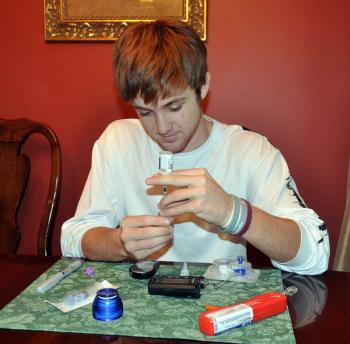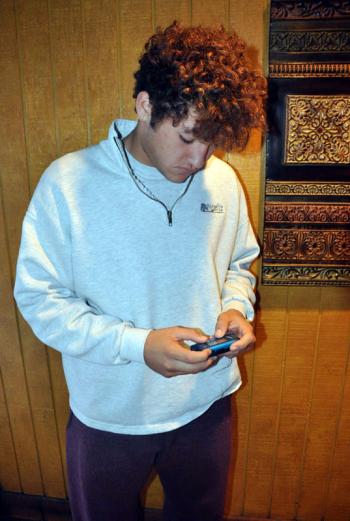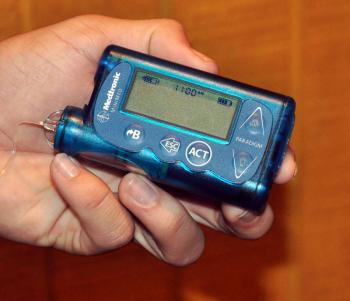


Two VC players share common bond: dealing with Type 1 diabetes
One dreadful disease brought two families and two young men closer to where they now have a bond for life.
Vermilion Catholic football players Hunter Frith and Brennan Gallet were both diagnosed with Type-1 diabetes at different ages in their lives.
Frith, a junior defensive end, learned he had the disease at the age of 7, while Gallet, the senior starting quarterback, discovered he had Type 1 when he was 16 years old.
Hunter has been living with the disease for eight years, while Brennan, the last 17 months.
The disease strikes babies as well as adults.
When Brennan was diagnosed two summers ago after coming within hours of falling into a diabetic coma, one of the first people that called the Gallets was Dana Frith, Hunter’s mother.
Although the two have never met, Dana wanted to assure Angela, Brennan’s mother, Brennan was going to be OK and able to live a normal life.
Dana is a registered nurse and familiar with Type 1 Diabetes.
“I called and left her a message and said when she was ready to talk to give me a call,” Dana said.
Angela called back Dana a couple of days later after learning Brennan was out of the woods and would recover. Dana told her over the phone that she dealt with monitoring Type 1 for a few years and that she could educate the Gallets, if they wanted.
“We knew what they were about to go through,” said Dana. “It is a total change in Brennan’s life and the whole family.”
Type-1 diabetes is a genetic condition that impairs the production of insulin, which regulates the body’s utilization of sugars and other carbohydrates. Bottom line, the pancreas no longer produces insulin.
If the blood sugar is too high, a diabetic can become tired. In that case, insulin is needed. If the blood sugar is too low, a diabetic may experience blurred vision, shaking and confusion. In that case, the diabetic may need to consume sugar- or carbohydrate-rich food or liquids.
What’s essential in dealing with diabetes is management. It’s all about being mindful of how the body will react to different foods and exercise levels.
Since Hunter was seven, the Friths have been monitoring the amount of carbs that Hunter eats and he countered it by taking insulin shots. For the first six years, he has given himself the shots. There were times where he ate too much sweets and forgot to give himself a insulin shot and his blood sugar elevated. In the seventh grade, Hunter had Diabetic ketoacidosis (DKA) and almost went into a diabetic coma and could have died. He spent days in the hospital and DKA was brought on by him not monitoring his food intake correctly.
“It has been frustrating because it is like we are always nagging him,” said Katie, who is Hunter’s step-mother and also a registered nurse at Abbeville General Hospital.
“The hardest part has been monitoring what I eat and to make sure I eat the right things,” Hunter said.
After Brennan left the hospital, he and Hunter spoke about the insulin shots, which helped convince Brennan he wanted the pump and not take the shots. The insulin pump is the size of your palm of your hand and automatically pumps insulin into your body through a port. No needles are needed.
The diabetic figures out the amount of carbs (not sugar) he has eaten, and then types it into the pump, which calculates the amount of insulin needed to be pump into the body.
Two months after dealing with the shots and learning his body was adjusting to the insulin, Brennan wanted the pump.
It is a decision he does not regret. Dealing with having Type 1 Diabetes does have its issues, Brennan said.
“It takes a lot of discipline to manage it,” said Brennan. “You have to be on top of everything or you could hurt yourself badly. You can hurt yourself to the point of death if you do not do it well enough.”
With Hunter still taking the insulin shots, Brennan, who was using the insulin pump, was able to sell Hunter the pump was better than the injecting needles into himself. After talking with Brennan, the next day, the Friths were at the doctor’s office looking into ordering the pump, which costs around $8,000. Hunter has had the pump for a year now.
“I like it (the pump),” Hunter said. “It is a lot easier than carrying around shots and sticking myself. I just put it in my pocket.”
Angela remembers Dana telling her that Brennan getting diabetes will help Hunter. It has, especially for athletics.
For practice and during football games, the two disconnect their insulin pumps and put it in a bag, which is not too far from them. In their bag are an emergency dose of insulin in case one goes into insulin shock. Both VC head coach Russel Kuhns and offensive coordinator “Roch” Charpentier have been educated and know what to do if either one has an insulin attack. During the game, the coaches know where the insulin bags are in case needed.
Neither player checks their insulin levels during the game unless they feel something isn’t right. The coaches and players also have a close eye on them and are not afraid to ask, “How is your blood sugar level?”
While both sets of parents have a constant eye on their sons and can monitor what they eat and the amount of insulin they take or don’t take, it is when they get older and are away from the coaches, friends and parents that worries them.
“We are not worried now about Hunter. It is the future,” said Trent Frith, his father. “When he gets 35 or 40 years old, and we are not around, is when we will worry. That is the age where people lose their legs or kidneys who have Type 1 Diabetes.”
The parents may not be there in 20 years to keep an eye on them, but Hunter and Brennan both know they have each others back because they are teammates for life.
- Log in to post comments
